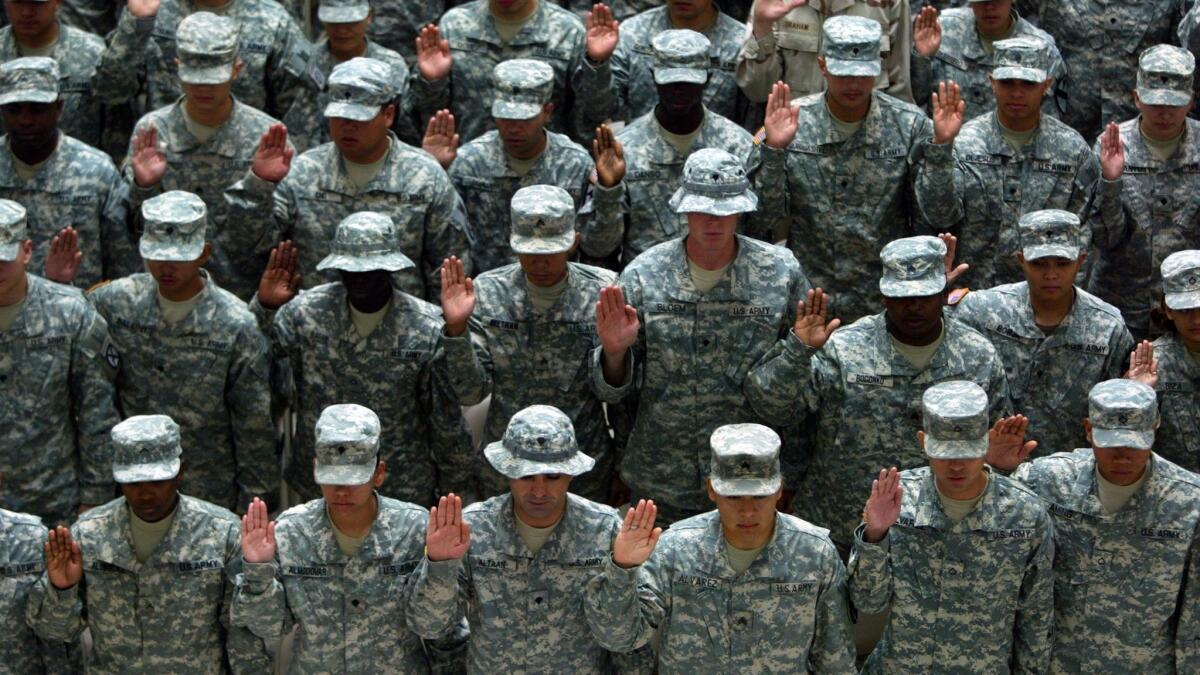After losing court battle, Pentagon will send green-card holders to recruit training

The Pentagon will begin sending a backlog of thousands of green-card holders to recruit training, suspending a policy adopted by the Trump administration last year that required more stringent background checks for some immigrants wanting to serve, according to two defense officials and an internal memo.
The policy called for green-card holders to submit to and complete a full background check and respond to any concerns before they could go to boot camp. That was in addition to standard requirements for green-card applicants, such as biometric screening.
The change put thousands of people in limbo as their screening languished and specific jobs within the military promised to them slipped away.
The new directive says that each armed service must comply immediately with a preliminary injunction issued last month in the U.S. District Court for the Northern District of California. In it, Judge Jon S. Tigar agreed with an argument from the lawyers of two prospective service members and the American Civil Liberties Union that the Pentagon had not satisfactorily explained why new screening is necessary. Tigar said the policy should be disregarded.
Air Force Lt. Col. Carla Gleason, a Pentagon spokeswoman, said the services will begin sending the recruits to training this week. They will be placed in available slots, and the services will have to consider factors such as their needs and prospective recruits’ preferences.
The injunction eases pressure on a group of prospective troops that the Pentagon has long recruited, pitching self-betterment and, in some cases, a chance at U.S. citizenship. About 18,000 U.S. troops were green-card holders at the beginning of the Trump administration, and about 5,000 joined the military each year before the stricter policy, Pentagon officials have said.
Some military officials have raised concerns internally that the growing backlog of green-card holders could present problems for a military always in need of new troops.
The directive, which was obtained by the Washington Post, was issued two days after a reporter began asking military officials last week about the glut of potential recruits waiting to train and whether it was complying with the injunction.
In the Navy, officials overseeing the issue called it “untenable” in a recent document reviewed by the Post and warned that the situation brings “increasing risk of mission failure.”
The document said the average wait time for a green-card holder to join the U.S. military had grown to 354 days as opposed to 168 for U.S. citizens, raising the possibility that the Navy would miss its recruiting goals.
If the Pentagon ordered the services to comply with the court injunction, the Navy should ship lawful permanent residents to the “maximum extent possible” to fill about 1,154 open slots in recruit training in December and January, officials added.
A military official, speaking on the condition of anonymity due to the sensitivity of the issue, said the Navy has more than 2,870 green-card holders under contract and waiting to go to recruit training.
A Marine Corps spokesman, Gunnery Sgt. Justin Kronenberg, said his service had 1,062 additional green-card holders awaiting recruit training. Like the other services, the Marines were awaiting additional guidance from the Pentagon last week.
“The Marine Corps Recruiting Command has kept full pace with [Defense Department] policy updates and is in compliance with all guidance regarding Lawful Permanent Resident accessions,” Kronenberg said. “We’ve maintained maximum transparency concerning the process with our LPR applicants to ensure they and their families are informed and their questions are answered.”
The Marine Corps sent 1,044 green-card holders to recruit training in 2016 and 1,169 in 2017, but the number dropped to 808 in the most recent fiscal year ending in September.
The Air Force sent 567 green-card holders to recruit training in 2016 and 590 in 2017, according to data provided by the service. But that number dropped to 44 in the fiscal year ending in September. About 470 green-card holders are under contract and waiting to attend training.
The Army sent 4,600 green-card holders to recruit training in 2016, and 3,600 in 2017, according to data provided by the Pentagon. That number plummeted to 513 in 2018, as the Army also missed its recruiting goal in 2018 for the first time since 2005 by about 6,500 soldiers, despite spending more than $200 million on bonuses. The service declined to say how many green-card holders are in its system waiting to ship to training, citing the open litigation.
The green-card holders originate from many countries with which the United States has friendly relations, with lawful permanent residents from the Philippines making up the largest number. In the Navy, about 656 of the group waiting to go to boot camp are from there.
China, Jamaica, Nigeria and Mexico are among the other nations with significant numbers, according to data provided to the Post.
The Pentagon has grappled with frequent Chinese efforts to steal U.S. secrets and is concerned about Islamic extremism in Nigeria, but it also has lauded the past efforts by green-card holders from those nations to join the military and earn their citizenship.
The suit filed in California by the ACLU details the cases of Jiahao Kuang, who moved to the United States from China at age 8, and Deron Cooke, who successfully applied for a green card at age 22 and emigrated from Jamaica.
Kuang grew up in California and enlisted in the Navy in July 2017, motivated by a desire to serve the United States and earn money for college, according to court documents for the case. He was initially expected to head to training in July 2018, but that date was later shifted until January. He did not apply for college in anticipation of joining the Navy, the documents said.
Cooke, unaware of the Pentagon’s new policy last year, resigned from a job in anticipation of soon joining the Air Force as an auto mechanic. He, too, was caught in limbo and still hasn’t begun training.
The judge ruled that the two recruits are representative of the kind of people affected by the Pentagon’s policy. The court will continue to review the issue.
Dan Lamothe writes for the Washington Post.
More to Read
Start your day right
Sign up for Essential California for news, features and recommendations from the L.A. Times and beyond in your inbox six days a week.
You may occasionally receive promotional content from the Los Angeles Times.






